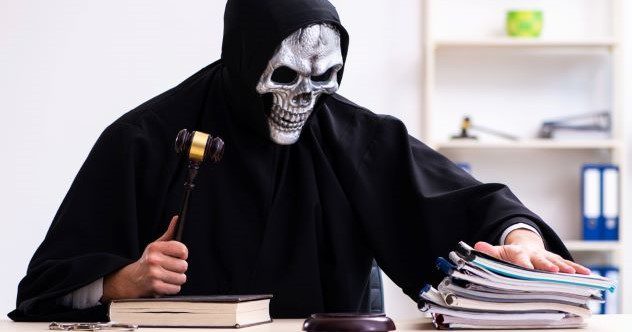Supernatural things are, by their very nature, outside of the realm of the everyday world. Some people believe in them, some do not. Most of the time, disputes about ghosts or spirits are something that happens over the dinner table or in the pub, but sometimes, they get dragged into serious matters. Throughout history, there have been a number of cases where courts have been forced to rule on issues relating to ghosts, gods, and generally dubious beings.
Here are ten lawsuits where the supernatural was put on trial.
Related: 10 Scientific Theories To Explain Why We See Ghosts
10 The Ghost Writer
Francisco Cândido Xavier, better known as Chico Xavier, was one of the most popular Brazilian authors of the 20th century. The author of 450 books, there was something special about his method of working. All of his texts, Xavier claimed, were channeled through him by spirits in a process called psychography. Xavier was a spiritist and believed that mediums like himself could contact disembodied spirits, including the souls of the dead. Many of his books were actually written by other dead writers.
This brings up a number of ethical and legal problems. The one that concerned the family of the deceased poet Humberto de Campo was who should get the royalties of these posthumous works. Xavier claimed that de Campo had written them through him, but it was Xavier who took the money. De Campo’s family thought the money should be theirs—or Xavier should admit he was faking the works—and sued.
The case came to trial in 1944, with the family insisting that everyone involved in the trial, including Humberto de Campo’s spirit, should be forced to attend. Alas, before he could turn up, the judge dismissed the case as dead people have no civil rights, and a family could only claim ownership of works produced by an author before their death.
In 1981, two million signatures were collected from people calling for Xavier to be awarded the Nobel Peace Prize. He did not get it.[1]
9 Betty Penrose v. God

When bad luck strikes, it is a natural reaction to shake our fists at fate, fortune, or the gods. For most of us, we simply get on with life, but some people decide that someone has to pay for their bad luck. Americans are known to be litigious people, so it should really be no surprise that God has been brought to trial in the United States.
When Betty Penrose’s house in Arizona was struck by lightning and burned down, there was really only one person to blame. With the help of her lawyer boss, a case was brought in California in 1969 against God, seeking $100,000 in damages as they alleged God controlled the “operation of the universe, including the weather in and upon the State of Arizona.”
The case was able to be heard in California because a property had recently been transferred to the legal ownership of God. If God could own property, then he could be sued. However, the deed for this transfer was ruled to be invalid, but Penrose’s case had already been adjudicated. She won, by the way, but was never able to collect her judgment.[2]
8 Ernie Chambers v. God
When you are in charge of the whole universe, it makes sense that the buck will finally stop with you. God has been sued multiple times. In 2007, Ernie Chambers, a state senator for Nebraska, became the latest to try.
Chambers was seeking a judicial injunction to order God to stop his “fearsome floods, egregious earthquakes, horrendous hurricanes, terrifying tornadoes, pestilential plagues, ferocious famines, devastating droughts, genocidal wars, birth defects, and the like.” God could be sued in Nebraska thanks to his being omnipresent and having “putative” agents (priests) operating for him. Because God was omniscient, he could not claim to be unaware of the harm he was causing.
The case made it before a judge but was dismissed as God could not be contacted and summoned to trial. For Chambers, however, this was a victory. He had no intention of suing God—he was simply trying to make a point that any case deserved to be heard and not simply dismissed as frivolous. A trial involving rape and the plaintiff’s right to call the crime a rape had been dismissed previously as “frivolous.”[3]
7 Pavel Mircea

When a person is baptized, do they form a binding legal contract with God? That was the question at the heart of a Romanian prisoner’s lawsuit. Pavel Mircea was serving a 20-year prison sentence for murder when he came to believe that his crimes were actually due to Satan. Why had God not protected him from Satan’s influence?
God, he claimed, had been happy to accept his prayers and offerings but had failed to deliver on the benefits that being a Christian was supposed to provide. Thus, God was in breach of contract. As God’s representative, Mircea was also suing the Orthodox Church.
Mircea’s efforts were in vain. The case was dismissed as God was not a citizen or a company in Romania’s jurisdiction.[4]
6 Stambovsky v. Ackley
Helen Ackley claimed to have experienced years of poltergeist activity in her New York home. She talked about her experiences in several press articles, and her home soon began to get a reputation for being haunted. When she sold the house to Jeffrey Stambovsky, she is said to have informed him about the hauntings, to which he replied, “We’ll have to call in the Ghostbusters.” Then, the contract was signed.
Soon, however, Stambovsky got cold feet. He claimed to have only just found out about the hauntings and wanted to pull out of the sale. He then took Ackley and her real estate agent to court, claiming fraudulent misrepresentation of the property.
A first trial was dismissed, but Stambovsky appealed. The court then ruled that “as a matter of law, the house is haunted.” This was not because they found that ghosts are real but rather because having the reputation of being haunted would affect the value of the property. It also found that buyers had a duty to check a property before they buy—but that as ghosts cannot be seen, they allowed the contract to be broken.[5]
5 Burchill v. Hermameyer

In 1919, a Mr. Hermameyer was informed by a Mrs. Burchill that there was a fortune in oil on her property. All he had to do to get a share of this bountiful oil was to invest in her oil company. He did, putting up $10,000 of his money. That was a vast sum. Why did he have so much faith that oil would be discovered? Mrs. Burchill had been told about the oil by a medium who had learned about the oil from a spirit.
Hermameyer sued Burchill to get his money back when the ghostly oil prospector proved to be wrong. No oil was found. Hermameyer contended that his mind was “in an abnormal and irrational condition” when he believed the spirit, so his money should be returned to him.
The court did not agree. While it did not deny that it might be possible for spirits to communicate with the living, “these subjects belong to realms and powers that as yet must generally be classed as purely speculative, and not so established by evidences cognizable by the law which we are required to administer as to be classed as facts—as among proven things.” He had chosen to act on his belief in ghosts, so the investment was not made on the basis of fraud.[6]
4 McClary v. Stull

In 1895, the Nebraska Supreme Court heard a case involving a will and the influence of ghosts. Elizabeth Handley was a widow who had strong spiritual beliefs. She was known to consult spirits, including that of her dead husband, using a planchette—a bit like using a Ouija board. When she died, her will was read, and it announced that almost all of her estate was to be sold and the money left to a charity called The Home of the Friendless. Her children sued on the grounds that the will had been made on the advice of the spirit of their dead father.
The court found that the will should stand. “Law, it is said, is ‘of the earth, earthy’ and that spirit-wills are too celestial for cognizance by earthly tribunals—a proposition readily conceded; and yet the courts have not assumed to deny to spirits of the departed the privilege of holding communion with those of their friends who are still in the flesh so long as they do not interfere with vested rights or by the means of undue influence seek to prejudice the interests of persons still within our jurisdiction.” Since the dead woman was not insane in her beliefs, she was free to leave her money however she wanted.[7]
3 Edward Stribbling Shue
There is only one case in the United States where the evidence of a ghost has led to a successful conviction. When Edward Shue’s wife, Zona, was found dead at the bottom of the stairs in her house, he moved her to the bed and dressed her in a high-necked collar before the doctor could arrive. When the doctor came, he examined the body, except for the neck and head, which were hidden and which Shue was cradling in anguish. Most accepted the finding that it had been a simple accident. Zona’s mother suspected foul play, however.
At night, Zona’s ghost would come to the grieving mother and tell her what had really happened. The ghost claimed she had been strangled and had her neck broken at “the first joint.” Zona’s mother pushed for an investigation, and the dead woman was exhumed. She was found to have been strangled and had her neck broken at just the place the ghost had mentioned.
Edward Shue was charged with murder. Perhaps hoping to discredit the ghostly testimony, Zona’s mother was called to give evidence about the apparition. Evidently, the jury found her convincing, for they found Shue guilty of murder, and he was sentenced to life in prison.[8]
2 Hammersmith Ghost Murder
Today, ghost hunters generally go armed only with video recorders when they try to capture a ghost. This was not always the case. In 1804, there were many reports of a spirit attacking people in the Hammersmith area of London. It was said to be a tall man dressed all in white and may have been the restless soul of someone who took their own life. Gangs of men formed to search the streets for the phantom.
When Francis Smith saw a man dressed all in white one night, he knew he had found the ghost. He shouted to the ghost, “Damn you; who are you and what are you? Damn you, I’ll shoot you.” And he did. The bullet hit the ghost in the jaw and knocked him to the ground. Soon, it became clear that the ghost was no more than a bricklayer called Thomas Millwood wearing the white garb that people of his profession always wore. He died on the spot.
Smith was brought to trial for murder. The heightened tension caused by rumors of a ghost was no defense, so he was found guilty and sentenced to death. This was later commuted to a year of hard labor, but the precedent stands in English law that believing someone is a ghost is no justifiable reason to kill them.[9]
1 Gerald Mayo v. Satan and His Staff
Suing the Devil is a risky business. One has to assume that the Devil has access to all of history’s greatest lawyers in his role as ruler of the damned. Still, in 1971, Gerald Mayo, who was a prisoner in Pennsylvania, submitted a case against Beelzebub.
According to the lawsuit, the Devil was at the root of all Mayo’s problems. “Satan [had] on numerous occasions caused plaintiff misery and unwarranted threats, against the will of plaintiff, that Satan [had] placed deliberate obstacles in his path and [had] caused plaintiff’s downfall.” Because of these actions, Satan and all his evil minions had denied Mayo his constitutional rights.
The judge was forced to deny the motion to sue Satan for several reasons. There was no evidence that the Devil was a resident of the district, so the court might not be the right place to bring the trial. There was also the problem of delivering a summons to court to Satan. Few people would be willing to make the trip to Hell to serve papers.[10]
